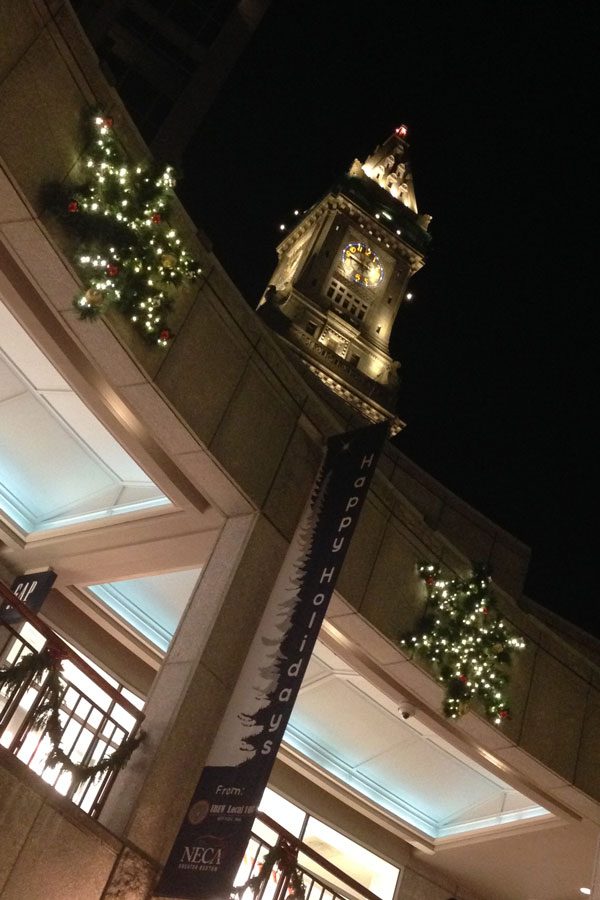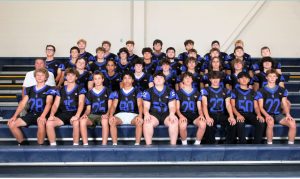The Evolution of Christmas
A sign in downtown Boston says “Happy Holidays” instead of just “Merry Christmas”, ensuring that all holidays celebrated are included.
December 21, 2017
Throughout the centuries, Christmas has become one of the most prominent holidays celebrated by Americans,though its significance varies among individuals.
Originating from the Roman celebration of the winter solstice, Saturnalia, Christmas has changed drastically throughout history. Even today, when Christmas is a federally recognized holiday, the religious basis for the celebration of Christmas has been questioned, although this is somewhat irrelevant in the face of increasing consumerism.
Yet even as the holiday came to the New World, it changed significantly. In fact, it closely resembled a drinking festival, and was also associated with class riots. This gave many an incentive to try and rebrand the holiday. It wasn’t until the late 1800s that the modern celebration of Christmas emerged, which was largely drawn from such books as A Christmas Carol, and The Sketchbook of Geoffrey Crayon, gent. The Christmas portrayed by these texts popularized the idealistic view of the holiday, but few traditions existed in a country where Puritans had exterminated it. Therefore, a distinctly American celebration emerged, based on the influences of its immigrants. Since this time, Christmas has dominated the month of December and become a mainstream holiday.
Today, Americans celebrate Christmas in many different contexts. According to the Pew Research Center, of the 92% of Americans who celebrate Christmas, 32% do so for cultural reasons, while 51% say they celebrate it as a religious holiday. Lily Coady ‘20 says that she celebrates “for more family-related purposes, and not for religious reasons. We use it as a time to get together and appreciate family.” The education system reinforced providing more time with family by adding the national holiday vacation – instituted in 1870 – with the week-and-a-half long break that students receive.
Sentimental value aside, Christmas has also become increasingly more commercialized. In 2017, the average American adult will spend roughly $900 on Christmas. Subsequently, many businesses prosper during December. This encourages businesses to spend money to launch aggressive ad campaigns for Black Friday and beyond, which in turn, increases spending. While many feel that consumerism is having a negative impact on the holiday, others believe that it has positive benefits. The extra money that is spent has a positive effect on all sizes of business. As mentioned earlier, $900 a person is very significant, so it is an important retail event. Many believe that this economic stimulus should not be retained. Indeed Ramkumar Senthilkumar ‘20, who is Hindu, asserted that he celebrated Christmas when he was younger. This is also a special situation for Ram, as Christmas lacks Hindu counterpart. He also believes that Christmas was very commercialized, considerably more than Hindu holidays such as Diwali.
Despite the consumerism that has started to permeate the month of December, Lily Jackson ‘20 still believes that “the most important thing about Christmas is coming together to celebrate, whether it is the birth of Jesus or celebrating family, and as long as people understand the importance of this time of year, it is fine.”
While many feel that consumerism is having a negative impact on the holiday, others believe that it has positive benefits. The extra money that is spent has a positive effect on all sizes of business. As mentioned earlier, $900 a person is very significant, so it is an important retail event. Many believe that this economic stimulus should not be retained.
For over a hundred years Christmas has been the dominant December holiday, but this is starting to change. Although it may still be the most prevalent, other holidays have started getting more recognition, especially in schools. Dale Jacobs ‘19 said, “Christmas, especially at HB, is just what the majority of people celebrate… But diversity is a big part of high school, so saying ‘happy holidays’ is becoming more popular than just saying ‘Merry Christmas.’” While many people find this idea agreeable, there are those that believe it is a topic worthy of debate, only doing damage to the season’s joy.
Christmas has been an important part of holiday culture for a long time, and throughout this period, traditions associated with it have fluctuated.












![Students in Archaeology use tools in a mock excavation. As a class that focuses on hands-on learning, students are able to gain crucial life skills. “[The class] is more hands-on than I thought, and I'm learning way more with physical activities than I do in the classroom,” said student Tess Brown ‘25.](https://cavchronline.com/wp-content/uploads/2024/11/IMG_8390-e1733078359165-278x300.jpg)


